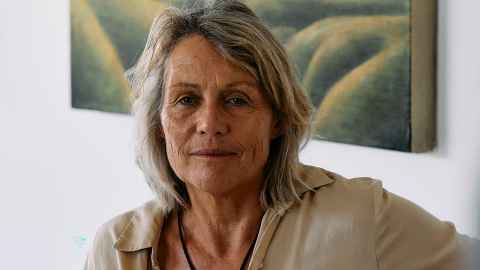Dianne Taylor’s TV triumph: After the Party
24 May 2024
University of Auckland English alumna Dianne Taylor answers questions for Ingenio magazine about her hit TV drama, After the Party, starring Robyn Malcolm.

After the Party has been describe as the best TV drama New Zealand has had. The Guardian described it as one of the greatest performances in any TV show in years. As the co-creator, how do you take on board such accolades?
With a bit of surprise to be honest, but also huge relief. My only goal was to write something that wasn’t total shite, so anything on top of that has been a bonus. The critical response has been gratifying, but what’s been amazing for us is the people who come up to us and want to talk about it. That tells us that they’ve connected to it at a deep level.
Robyn Malcolm has said, “I’ve never seen a writer write like Di did”. What made you so passionate about this script?
What made this experience different and deeper, was our process of building and evolving the character of Penny over quite a few years. Robyn and I knew from the start we wanted to create a middle-aged female character who didn’t have to be likeable. You see the results of that approach way too often, particularly with older female characters who have to be charming or quirky or giggly to be acceptable. We wanted to build a character who didn’t care what people thought of her. She’s angry, flawed, stubborn and blindingly honest – a bit more like the sort of women we actually know and love. Knowing that Robyn would play Penny was a gift to me; I could really push her character and people would still engage with her because, well, she’s Robyn.
In production, you used other writers too. How was it to let go of ‘your baby’?
Excruciating, but that’s the big difference between writing a film and writing TV drama. Writing a film, it’s generally just you or maybe you and a co-writer. TV is different. When it gets green-lit, it’s usually off the back of a pilot script and a story outline, so there’s still a huge amount of work to be done before you go into production. It took me a while to accept that there was no way I could write six episodes in six months. That was hard after having spent so long developing the series, but I was lucky to be able to bring in a bunch of amazing writers who could take drafts off my hands. I now understand it's a real gift to be able to bring in other writers.
Your career as a screenwriter includes Beyond the Known World and Apron Strings. When you came up with After the Party, did you know it would be ‘the one’?
Not at all. I don’t think you ever know that from the outset. I started to hope that it might be quite good when I saw the first edits, but we didn’t know until we saw the first reviews and then the phenomenal response from viewers.

In my final year, [Associate Professor] Shuchi Kothari began teaching
screenwriting and I jumped in ... Little by little, I let go of my day job and started to see myself as a screenwriter.
Robyn Malcolm won best actress at Series Mania – does it feel like shared glory?
I had a gut feeling Robyn was going to win best actress and I couldn’t have been more excited. Unfortunately, she wasn’t there to accept the award as she’d had to return to Tasmania where she was shooting another drama, so I got to go up on stage with our producer Helen Bowden to accept it on her behalf. You couldn’t wipe the grin off my face for days! After The Party also won Gold at the New York Festivals and we’re all chuffed with the results so far.
You did a BA in English. At what stage of life did you take up screenwriting?
I didn’t come to university until I was 32. Prior to that I’d worked in advertising as a copywriter and had dabbled in screenwriting. I came to the University of Auckland wanting to study English and was lucky enough to get into Witi Ihimaera and Albert Wendt’s Creative Writing Programme and loved it.
At the same time, I was broadening into Film Studies and quite a few Philosophy papers. Then, in my final year, Shuchi Kothari (now an associate professor in the Faculty of Arts) began teaching screenwriting and I jumped in. By then, I felt I was more of a screenwriter than a novelist. After that year, Shuchi and I collaborated on Apron Strings. Little by little, I let go of my day job and started to see myself as a screenwriter. It took a long time to not feel like an imposter.
Do you have any advice for novice scriptwriters?
You have to be hard-working, robust and determined. Take film studies papers, watch great cinema, rewatch it, analyse it, work out what you like and why.
Make contact with other filmmakers, join the NZ Writers’ Guild and Script to Screen’s mailing list for resources and opportunities. Have lots of projects on the go, not just one you labour over for years – it will go stale and you’ll get depressed.
Don’t expect everyone to love your first attempts, you’re probably not a genius, but you might just become a very good writer if you learn by doing it over and over. Listen to feedback, but also to your gut. And remember, we all have imposter syndrome.
A short version of this Q and A first appeared in the Autumn 2024 edition of Ingenio.